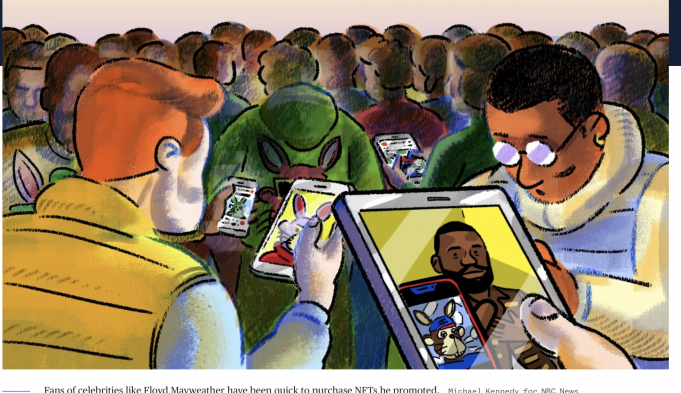NBC News, May 22, 2022 By Jesselyn Cook
When Floyd Mayweather started touting an obscure NFT project on Twitter this year, Tyler jumped at the investment opportunity.
Mayweather, a boxing legend, had already served as Tyler’s “biggest inspiration” in his martial arts training. But Tyler was also looking for investment opportunities and figured Mayweather, who often calls himself “Money May,” was worth listening to.
“What I need everybody to do right now: Go get a Bored Bunny NFT,” said Mayweather, dressed in a Louis Vuitton vest with a diamond bracelet, a necklace and a gold watch. “You’re hearing it from the one and only Floyd ‘Make-That-Money’ Mayweather.”
Tyler, 35, a property manager whose family runs a small Miami-based trucking company, said he put together about $12,000 with the help of his mother and bought the nonfungible tokens, or NFTs, digital tokens that convey ownership of digital images. In this case, the project was a series of images of rabbits similar in nature to the popular Bored Ape Yacht Club images that helped fuel a boom in NFT art projects.
Those NFTs are now worth far less than Tyler paid.
“This basically financially crippled me,” said Tyler, who asked to be identified by only his first name because he fears online trolls who ridicule unsuccessful NFT investors. Now, especially with inflation, Tyler said, he is struggling to afford gas for his car and groceries to eat. He said he feels Mayweather and the other promoters “took their payouts and moved on while everybody who scraped by to invest in their futures got robbed.”
The Bored Bunny team promised in its marketing materials that buyers could make “2x, 5x, maybe even 10x the value of [their] investment,” but the value of the NFTs attached to the images nose-dived after a brief spike and has yet to recover. The floor price of a Bored Bunny NFT now sits at 0.05 ethereum (currently $104.09), down from its mint price of 0.4 ethereum (about $1,504.54 at the time).
It’s a pattern that crypto critics, watchdogs and even some influencers point to as an ongoing problem: digital investments riding a wave of NFT enthusiasm and backed by high-profile endorsements that quickly lose value. In some cases, in the crypto world, it’s what’s known as a “rug pull.” But more broadly, ad transparency experts warn, public figures are promoting NFTs often without having done due diligence or warning their fans about the serious financial risks.
Bored Bunny’s founders, who declined to provide their real names, denied any wrongdoing. Mayweather’s publicist declined to comment.
Droves of celebrities and influencers have leaped at the chance to shill NFTs to their fans. Many of them don’t disclose that they were paid to do so and don’t acknowledge (or, in some cases, they actively downplay) the serious financial risks involved, said Bonnie Patten, the executive director of the consumer advocacy group Truth in Advertising.
“The messaging from these celebrities is like the 21st century equivalent of ‘Let them eat cake,’” Patten said. Mixing the “incredibly volatile” NFT economy and the “Wild West” of influencer marketing, she warned, is a surefire recipe for disaster. “It has the potential to financially wreck vulnerable people who look up to them.”
The multibillion-dollar influencer marketing industry has long been notoriously greedy, with online stars urging their followers to buy potentially dangerous weight-loss products to snake-oil wellness remedies. But the frenzied shilling of NFTs has raised the stakes to such extremes that in place of effective regulation, influencers and some celebrities have started calling out one another’s behavior.
Richard Bengtson, the founder of FaZe Clan, who’s known as FaZe Banks, tweeted screenshots of alleged messages from the Bored Bunny team offering him $500,000 to $750,000 to post about their NFTs. He said he “didn’t make this mistake” because he’d “taken the time to educate myself.”
FaZe Clan didn’t reply to requests for comment. Bored Bunny declined to confirm how much it paid its “commercial partners,” citing a confidentiality agreement.
Bored Bunny said in written direct messages that the team is “actively working on making this project great” but that it is “not responsible for investors not selling” at the optimal time. It said its team had received death threats from angry Bored Bunny buyers, leading it to cut off communication with the community, and that it is developing initiatives “to grow the project to the best of our ability.”









